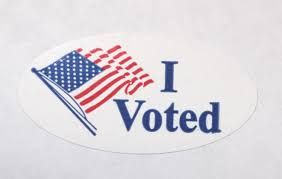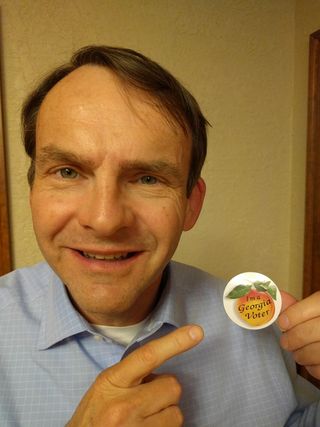Politics
"I Voted" Stickers: Are You A Good Group Member Too?
Evolutionary theory may explain the odd "I voted" selfie sticker.
Posted November 8, 2016

I’ve always been fascinated with the “I Voted” stickers poll workers give people after they vote. When I first started noticing them (Time suggests they first appeared in the 1980s), I couldn’t figure out why someone would want one.
I mean, it’s nobody’s business if I voted or not. And I assumed most people felt that way.
Then, when I became interested in politics as a science, I started wondering who takes and wears these things and who doesn’t? Is it the super-citizens who want them? The extroverts? Military folks?
On the other hand, once they gained prominence, who wouldn’t want one if they’d voted? The drum beat that voting is good starts when we’re in elementary school and continues throughout life in the US. Is it the hard-core privacy advocate who doesn’t want it? Someone rushing back to work too quickly to stop for one? (My wife tells me some people don’t like putting stickers on their clothes…I’m not that fashion sensitive, so I don’t know.)
EVO TO THE RESCUE
Finally, it occurred to me that our old friend evolutionary theory may shed some light on this. “I voted” stickers tell people you did your civic duty. And it’s not too hard to see that message is evolutionarily important.
More specifically, many evolutionary researchers argue that human sociality (i.e., the tendency to form groups) evolved because it promoted survival and reproduction in the dangerous ancestral environment. In that environment, people had to compete for survival resources such as food, shelter, protection, and mates, so conflict and war were common.
But, as the argument goes, people who joined groups were more likely to survive and reproduce because of the greater survival resources they could acquire due to the help they got from and gave to other group members. And group members expected everyone to contribute to group success to help enhance individual success. As such, evolutionary theorists suggest humans should be especially interested in people following group norms of behavior.
In evolutionary times, this meant behaviors like contributing to food collection and group protection. In modern times, this means activities like abiding by laws and, you guessed it, participating in group decisions such as voting.
So these stickers signal to others that you’re a dependable contributor to and member of the group, which in the evolutionary environment meant you were more likely to survive and reproduce.
MERE SPECULATION?
Doubt this? Maybe you should. But let me tell you about some research into how to get people to turnout to vote. This has been a hot topic in political science, with the result that political scientists and others have run big field experiments (including tens of thousands of subjects) testing voter turnout messages.
Telling people it’s their civic duty to vote doesn’t really work. Neither do messages about certain groups voting or not voting or a variety of other messages, except one type. The one type of message that consistently works is the social pressure message. In social pressure messages, the campaign indicates to a voter that it knows if s/he has voted or not (e.g., the infamous voter scorecards) or the scientist even tells the voter-subject that s/he is going to send a letter to the voter’s neighbors after the election telling them if the voter-subject voted or not. This one really works!
By the way, how do campaigns and scientists know if someone voted? As comedian Amy Schumer noted in her recent social pressure voter turnout video: “It’s a public record.” Yep, your county elections office keeps a record of whether you voted or not (not for whom you voted) and makes it publicly available in most states, even, again as noted by A.S., you mom.
So what’s one “good” way (I’m not sure it’s “good,” “effective” is probably a better word) to get people to vote, you simply tell them that their friends and neighbors can find out if they voted or not. In other words, you tell them that others can find out if they’re doing their civic duty and being a good group member. And evolutionary theory suggests that really matters.

YOU CAN COUNT ON ME
I got my “I voted” sticker. Did you?
* * * * * * * * * * * * * * * *
In addition to writing the "Caveman Politics" blog for Psychology Today, Gregg is the Executive Director of the Association for Politics and the Life Sciences and Associate Professor and Chair of Political Science at Augusta University. You can find more information on Gregg at GreggRMurray.com or follow him on Twitter at @GreggRMurray.
If you enjoyed this post, please share it by email or on Facebook or Twitter.




